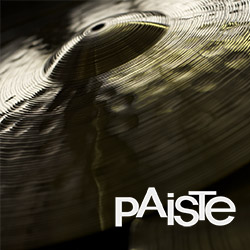Interview: Justin Peroff of Broken Social Scene @ Pitchfork Music Festival
Justin Peroff has crafted some of the catchiest drum parts of the new millenium with Broken Social Scene. Survey the past few years of indie music, and then go back and listen to You Forgot It In People. See what I mean? Some very influential grooves on that record. The excellence continues on their latest, Forgiveness Rock Record. He cuts through the wall-of-sound guitars and swirling vocals with crunchy hi-hats (“Forced to Love”), punching-bag bass drums (“Art House Director”), well-thought-out beats (“Romance to the Grave”) and good old-fashioned epic drum fills (“Water in Hell”).
Justin opens up about working with one of his biggest influences, John McEntire of Tortoise, and his anchoring role in the Noah’s-Ark-like ensemble.
Transcipt is below the video if the audio is too dodgy for you. –Paul Goodenough
TBDITW: Thanks for joining us. A big thank you to Jusitn Peroff of Broken Social Scene. Thanks for coming on, Justin. How long have you been playing with Broken Social Scene?
JP: Since the beginning, which was, I would say, 10 years ago.
TBDITW: And what is your main instrument?
JP: My main instrument is the drums.
TBDITW: What drummers who are playing now have really impressed you?
JP: I had the honor of working with John McEntire on this last record. And for us to even be in correspondence with him is a really big thing. And now I consider him a friend. That was massive for me since he is actually one of my favorite drummers. I’ve been heavily influenced by him. And he’s going to be playing with us tonight. That was like dream come true.
TBDITW: I noticed a lot of tracks on the album feature him on drums as well. How’d that work out? Was it at the same time or layered?
JP: Some of the parts are doubled – he doubled me on World Sick. He doubled me on some parts to beef it up a little bit. He recorded his drums in a different room, in a different way, with a different set up. On one song, “Ungrateful Little Father,” he’s playing the main drum part on that. He’s playing the main part on the Andrew Whiteman song, “Art House Director.” So on some songs it’s doubled, some are not, some have separate parts that complement each other.
TBDITW: Was there any tricks, any techniques of his that you really picked up on?
JP: If I did, it wasn’t anything specific, it was more subliminal. ‘Cause if I did, its not like I knew the guy when I was growing up listening to his records to be like “How’d you do that?” Sometimes subliminally, sometimes actually dissecting the part, you translate it in your own way and you approach it in your own way. The sound is a destination as opposed to a “how.”
TBDITW: What are some of the challenges to playing in a group with 9, 10, 11 people?
JP: Anchoring the stage sound. Telling people to turn down a lot. Getting In-Ears for the first time ever on this tour has helped me a lot. I can just dial in what I want, and everything else is pretty much nonexistent. So it’s almost like I’m pretending like the stage sound is taken care of, but it’s just taken care of in my head.
It is a challenge. But it’s a good challenge.
TBDITW: How do envision your role in the band recording and when you play live?
JP: How do you mean?
TBDITW: Well, you touched on “anchoring” the band. Does that carry over into “you’re the driver” or “you draw up the setlist?”
JP: Actually me and Kevin do the setlist together. Because we’re sticklers for things even like record sequence and the general flow of songs. And sometimes I don’t like certain songs to be together because it would be exhausting, or because of the flow, or certain beats are similar and we want them separate.
I guess I’m one of the (inaudible) members, and it weird to say that, but I’m just really fucking stubborn when it comes to my band. I’m really specific about how I think things should be, so I really don’t censor myself. Sometimes you have to be the squeaky wheel when there’s a lot of people. So I’m the annoying guy.
TBDITW: Well, that might be a universal drummer characteristic. What are some of your drumming strengths?
JP: I have no idea. You should let me know, after the show. I don’t know if I have any at all.
TBDITW: One thing I really like, a signature Justin Peroff move to me, which I don’t remember hearing until one of your first records was “Doo Doo Cha Ts Ts Doo Cha,” “…and 3…and 3…” Where’d that come from?
JP: I think I first did that in “Stars and Suns” during the breakdown. I think it was a combination of that rhythm, that pattern, but it was really made clear due to David Newfeld’s production. He’s a big fan of drums, he’s a big fan of my drumming he makes me sound way better than I actually am. With a lot of the compressors he uses, and the way the mics are situated, he either turns up mics that are way over there or over here there’s other sort of patterns that reveal themselves. So originally it was due to his production. And then after that, going back and listening to my own record, I was like, “(inaudible).”
I actually have friends who will make fun of me. They’ll just start mouthing drum patterns of mine, and that is one of them.
TBDITW: What’s your proudest contribution to the new album?
JP: That rhythm right there. No, I don’t know. The introduction of the (Roland) SPD-S drum machine was really fun. I started using it on the road before this tour. And playing around with John McEntire’s drum machine collection, having the liberty to do that, that was a fun contribution. And ultimately, it was fun to communicate the live drumming with a lot of those other drum patterns. That was a notable rhythm texture that happened from working with John.
TBDITW: You’re credited with vocals on the album? What was that?
JP: It’s called “Highway Slipper Jam.” There’s two studios. There’s the actual studio, and then there’s another room. They were doing some playback and I was in the hall just walking to the kitchen and I started singing that line as a joke, and the guys were like, “You need to record that right now.”
TBDITW: It’s quite humorous.
JP: It’s humorous for sure.
TBDITW: I like the element of humor.
JP: It’s a happy record.
TBDITW: It is! Forgiveness, happiness…do you have any feelings on what does the record mean to you? Kevin Drew said in an interview that it wasn’t like “religious” forgiveness necessarily. What does it mean to you?
JP: I think that any record that, I think this goes for a lot of artists, records are kind of like love letters for many reasons one of the emotions happened be leading throughout this whole thing was forgiveness, for a number of reasons. But I’m not really qualified to answer that since I’m not a lyricist.
(distraction in background)
TBDITW: That’s all I got for you.



